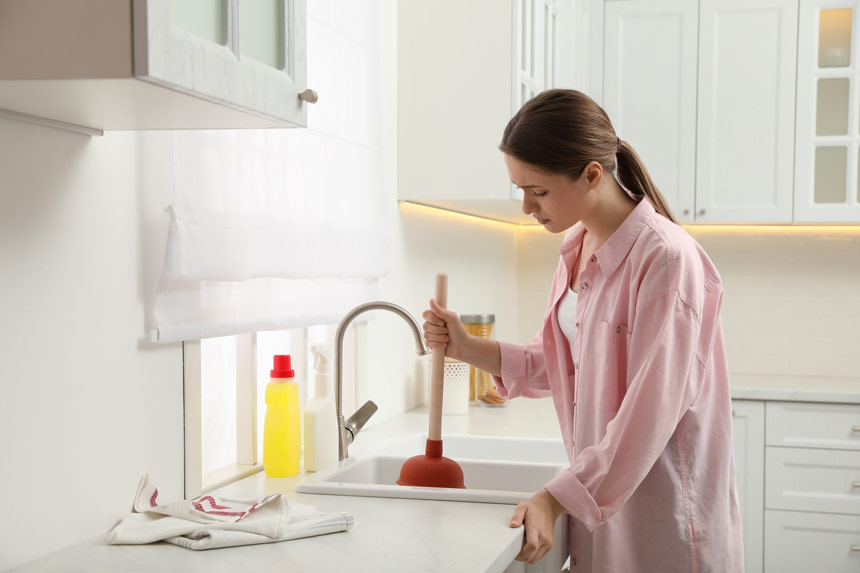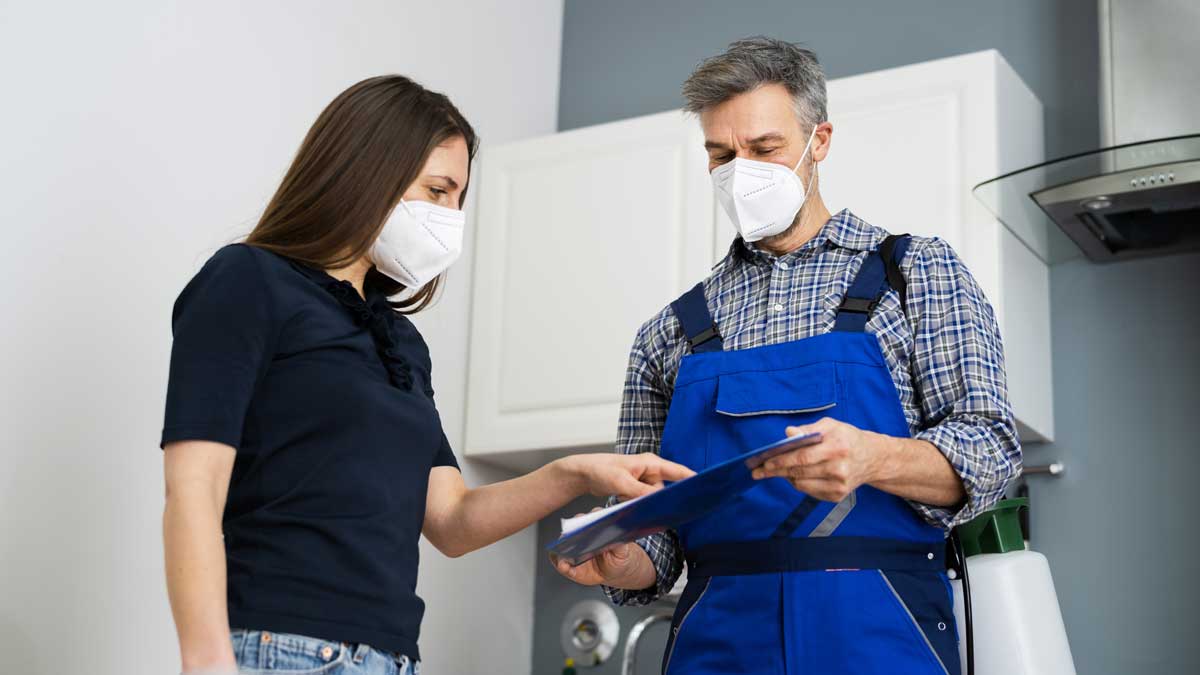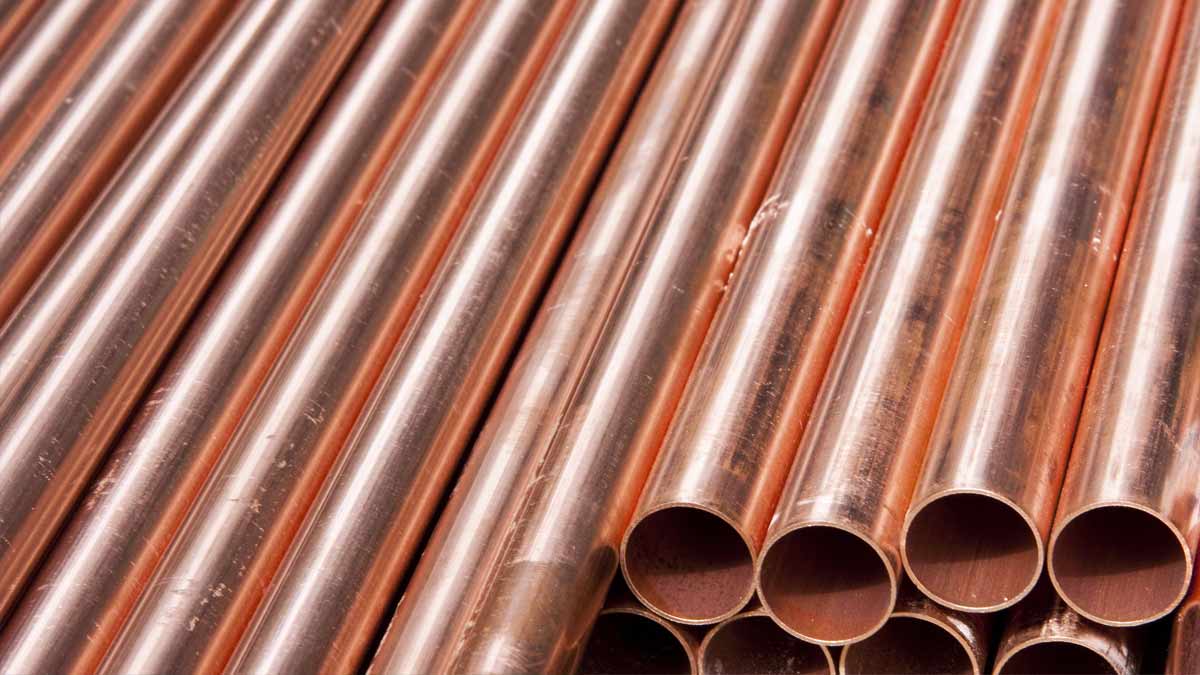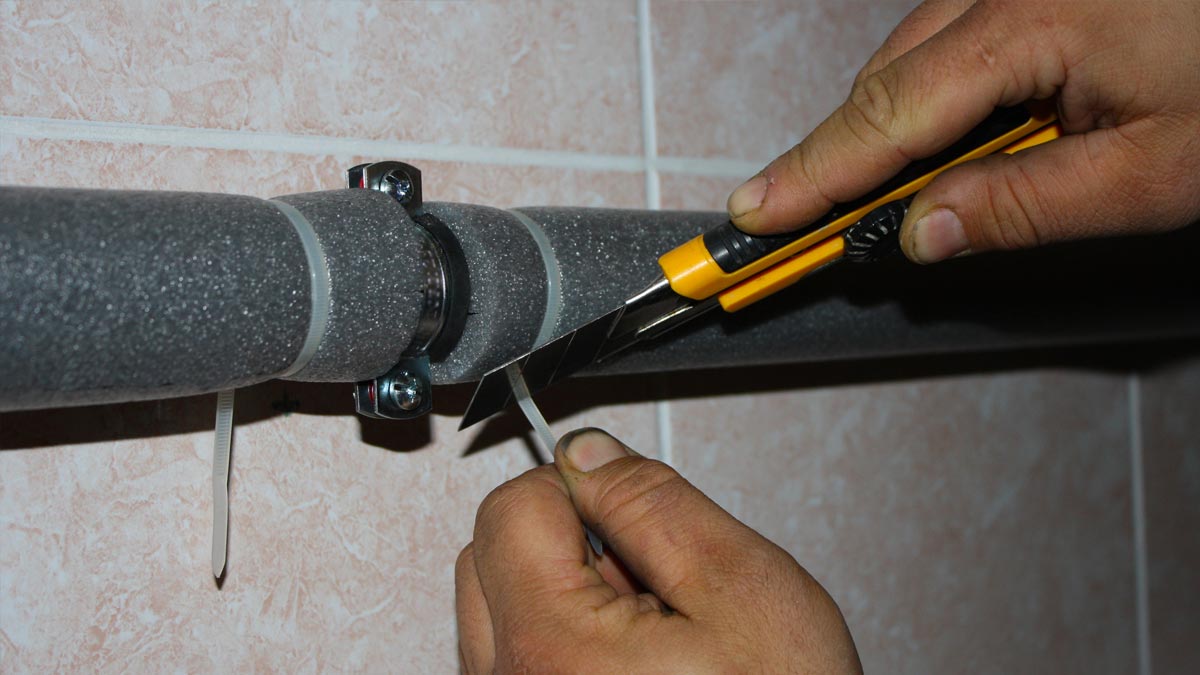Plumbing issues are an inevitable part of every household. A leaky faucet or a clogged drain may seem like minor inconveniences, but they can quickly escalate into costly repairs if left unattended. Knowing when to call a plumber can save you from unnecessary expenses and prevent major water damage to your home. In this article, we will discuss six common signs that indicate it’s time to pick up the phone and contact a professional plumber.
CLOGGED OR SLUGGISH DRAIN
Blocked or sluggish drains can be a frustrating problem that many homeowners in the UK encounter. When we use our sinks and showers, we often flush away a variety of substances, from food scraps and grease to hair and soap residue. However, over time, these materials can accumulate and form a blockage in the pipes, preventing water from flowing through as it should.
While some minor clogs near the drain can be resolved with simple remedies like baking soda and vinegar or a plunger, it’s best to call a professional plumber if the problem persists. Attempting to fix a serious blockage further down the pipe can cause damage to the pipes and make the problem worse. A qualified plumber can assess the situation and use specialized tools to clear the blockage safely and effectively.
In some cases, slow-draining water may indicate a more severe blockage, such as tree roots or a damaged pipe. If you notice any unusual sounds or smells, such as gurgling or sewage odours, this may also indicate a problem with the main sewer line. In these situations, it’s vital to seek professional assistance as soon as possible to avoid costly repairs and health hazards.
It’s important to take care of your plumbing before it starts regurgitating all your rubbish back into your home. By properly disposing of food waste, avoiding pouring grease down the drain, and using drain guards to catch hair and other debris, you can prevent blockages from forming in the first place.
In summary, if you notice slow-draining water or other signs of a blocked drain in your UK home, it’s best to seek professional plumbing services. A qualified plumber can assess the situation, clear the blockage, and advise you on how to prevent future problems.

UNPLEASANT SMELL
Foul smells emanating from drains can be an unpleasant and disconcerting experience for any homeowner. In the UK, there are several reasons why your drains may emit unpleasant odours. Identifying the root cause of the issue is the first step in addressing the problem.
One common cause of unpleasant odours from drains is food waste decaying in the drainpipe. When we wash dishes or pour leftover food down the sink, small particles can become trapped in the drain, where they begin to decompose. Over time, this can lead to an accumulation of organic matter that emits a foul smell.
Another potential cause of unpleasant odours from drains is sewer gas. If you detect a smell like rotten eggs coming from your drains, this could be a sign of a blocked drain vent. Drain vents allow sewer gases to escape outside, preventing them from building up in your pipes and releasing into your home. However, if a vent becomes blocked, these gases can accumulate and create an unpleasant smell.
If you notice a smell coming from all drains in your home, this could be a sign of a more serious issue. Frequent clogging and unpleasant odours can be a sign of a damaged sewer line. Tree roots can grow into pipes, causing blockages and damaging the lines, while age and wear can cause pipes to deteriorate and crack. If left unaddressed, a damaged sewer line can lead to serious health hazards, such as exposure to harmful bacteria and sewage.
If you are experiencing unpleasant smells from your drains, it is important to take action to address the problem. Start by identifying the source of the odour and take steps to prevent the issue from recurring. You can try running hot water and vinegar or a baking soda solution down the drain to clear out any organic matter, or use a drain cleaner specifically designed to tackle the issue. If the problem persists, contact a qualified plumber who can inspect your pipes and identify any potential damage or blockages that need to be addressed.
WEIRD SOUNDS
There are different plumbing issues that can cause your pipes to produce gurgling sounds or weird noises. It’s important to pay attention to these sounds and take action to prevent any potential damage to your plumbing system.
One of the main causes of gurgling pipes is the formation of a clog in your drainage system. If you hear gurgling sounds coming from your sink, this may be a sign of a clog that’s forming in the pipe. However, it’s also possible that something is blocking a vent pipe that’s designed to release sewer gases outside your home. In most cases, the main vent pipe that exits your home through the roof may get clogged with debris such as leaves, bird’s nests, or even dead animals.
It’s important to handle these issues in a timely manner to prevent any potential backups or damages to your plumbing system. If the issue is not addressed, it could lead to water backing up into your home.
Another potential issue that can cause gurgling sounds is when there is air trapped in your water pipes. The trapped air increases the internal pressure, putting a strain on your pipes, which can eventually lead to loosened joints or even cracking. It’s important to address this issue promptly to prevent any potential damage to your plumbing system.
If you turn on your tap and notice that the water is spluttering, this is a sign of air escaping from your pipes. However, if you hear a persistent rattling or banging noise, this is a more serious issue that requires professional assistance. This may indicate that your plumbing system is not functioning correctly, and it’s essential to get it checked out as soon as possible.
It’s also important to note that strange noises may occur when using specific plumbing fixtures like toilets, showers, or running washing machines. For example, a toilet that is not in use or a shower that’s in use may cause the plumbing system to try and find air to mix, so the lines can flow correctly. If you notice any unusual sounds coming from your plumbing system, it’s important to address them promptly to prevent any potential damage to your plumbing system.
In summary, gurgling sounds and weird noises coming from your plumbing system are often indicative of underlying issues. It’s important to take prompt action to prevent potential damage to your plumbing system and address any potential clogs or blockages in your drainage system. If you’re unsure of the cause of the sounds, it’s best to seek professional assistance to diagnose and resolve the issue.
CONSTANT DRIP
The sound of water dripping from a tap is a familiar sound in many UK households. However, when droplets continue to trickle from the faucet even when turned off, it could indicate a problem that needs attention. While some may view this as a minor issue that doesn’t require fixing, it can lead to significant water wastage and increased utility bills over time.
Ignoring a dripping tap is a costly mistake as it can waste dozens of gallons of water each day. In fact, according to the Energy Saving Trust, a dripping tap can waste up to 5,500 litres of water per year, which is enough to fill 22 bathtubs. This can result in unnecessary water bills and put extra strain on the environment by using up precious resources.
It’s important to address a dripping tap as soon as possible to avoid water wastage and save money. A dripping tap can be caused by a variety of issues, such as a worn-out washer, a loose or damaged valve or a faulty tap mechanism.
MURKY WATER
There are several signs that your water supply may be compromised, and it’s important to take action to ensure that the water you and your family consume is safe and healthy. Here are some common issues to look out for:
- Discoloured water: If the water coming out of your tap looks brown or dirty, it’s possible that dirt and sediment is entering your water supply. This is often caused by a broken main water line, which can be the result of old age, shifting earth or tree roots interfering with the pipes. If you notice discoloured water, it’s important to stop using the water immediately and have your system inspected by a qualified plumber.
- Metallic taste or smell: If your water suddenly tastes or smells strange, this could be an indication that your pipes are corroded and the metal is leaching into the water. This can happen over time due to exposure to acidic water, and can be exacerbated by high water pressure. In some cases, the issue may be with the main water supply, such as when tree roots crack the pipes and outside materials enter the water supply. If you notice a metallic taste or smell, it’s important to have your water tested and your pipes inspected by a professional.
- Murky water: If your water appears murky or cloudy, this could be a sign of excess sediment or minerals in the water. This can happen when water is drawn from a well or when the water supply undergoes changes in pressure, causing sediment to be stirred up. While this may not necessarily be harmful, it’s important to have your water tested to ensure it is safe to drink.
In any of these cases, it’s important to address the issue as soon as possible to ensure that your water supply is safe and healthy for consumption. This may involve replacing damaged pipes or installing water filtration systems to remove contaminants from the water. Regular water testing and maintenance can also help to identify issues before they become major problems.
LOW PRESSURE OR WEAK FLOW
Experiencing low water pressure is frustrating, especially when all you want is a refreshing shower or to quickly wash your dishes. Unfortunately, low water pressure is a common problem in many homes and can be caused by a variety of issues. One of the most common causes of low water pressure is a clogged pipe. When a pipe is leaking, it can block the flow of water and make it feel as though you are getting a light mist instead of a stream of water.
There are several reasons why a pipe might leak. For instance, old age, shifting earth, or tree roots can cause a pipe to break. Additionally, poorly sized pipes can also cause low water pressure. To fix low water pressure issues, it’s important to determine whether the problem is isolated to one area of your home or if it is affecting your entire plumbing system.
If the low water pressure is affecting multiple areas of your home, it’s time to call in a professional. Plumbers can quickly diagnose the issue and determine whether you have a leak, a broken pipe or valve, or trouble with your hot water heater. Many causes of low water pressure are easily and cheaply fixed but can lead to expensive emergency repairs if ignored.
If you are experiencing low water pressure from your faucet, it may be due to a clogged aerator or screen in your faucet. You can easily fix this issue by unscrewing the aerator, cleaning it out, and reattaching it. If this does not resolve the issue, then it may be time to call a plumber.
Another issue that can cause inconsistent water flow from your faucet is air in the water pipes. When air gets into your pipes, it can disrupt the flow of water, causing blockades that reduce water pressure. This can be a sign of a leak or breakage somewhere in your home’s pipes, which requires urgent attention from a qualified professional. Installing proper filtration systems in front of the main water pipes can also prevent this problem by reducing the amount of mineral deposits that build up in your pipes.
Finally, if only a trickle of water is flowing through your taps, it may be time to replace your washer or check your aerator for cleaning. Aerators can trap grit and other solids in the water line, causing low water pressure. When your aerator doesn’t need cleaning, it may be time to replace your tap washers.
In conclusion, low water pressure can be a frustrating problem to deal with, but it’s important to address the issue quickly to prevent further damage to your pipes and appliances. If you are experiencing low water pressure, don’t hesitate to call a professional plumber who can diagnose and fix the issue.
OTHER
One of the most obvious signs that you need a plumber is a musty smell of mildew. Mildew can grow quickly in areas that have a plumbing leak, and it can become increasingly pungent over time. If you notice a musty odour in your home, it is important to investigate the cause immediately. Mildew can often be invisible to the human eye, and it can grow within 48 hours of water exposure. It can even be concealed within your floor due to a broken heating pipe. If you notice your tiles bulging, this could be a sign of a leak.
Mould is another sign that you might need a plumber. Mould is a fast-spreading bacteria that feeds on the moisture of different structural materials. It can be extremely harmful to your health, causing symptoms such as sore throat, coughing, headache, watery eyes, and sneezing. If you find mould in your home, it could be a sign of a plumbing leak, and you should contact a plumber immediately. The plumber can identify and repair the leak, preventing further mould growth and protecting your health.
Other senses can also be helpful in detecting plumbing issues. If you hear dripping or running water when no taps are on, this could be a sign of a plumbing leak. Similarly, if you feel dampness or wetness in walls, floors, or ceilings, this could indicate a leak. Finally, if you see discoloration or staining on walls, floors, or ceilings, this could be a sign of a plumbing leak that has been occurring for some time. In all of these cases, it is important to contact a plumber as soon as possible to prevent further damage and ensure that your home is safe and healthy.
Ignoring plumbing issues can lead to more significant problems in the long run. From clogged or slow drains to low water pressure, the six signs discussed in this article are all indications that it’s time to call a plumber. Remember that a small leak can quickly turn into a burst pipe, causing significant water damage to your home. By recognizing these warning signs and taking prompt action, you can save yourself from costly repairs and ensure the smooth operation of your plumbing system.
How useful was this post?
Click on a star to rate it!
Average rating / 5. Vote count:
No votes so far! Be the first to rate this post.











